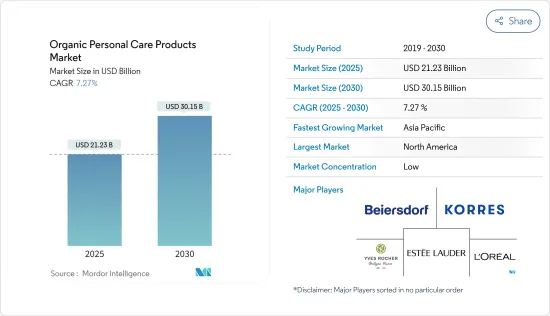
|
市場調査レポート
商品コード
1685891
オーガニックパーソナルケア製品:市場シェア分析、産業動向・統計、成長予測(2025年~2030年)Organic Personal Care Products - Market Share Analysis, Industry Trends & Statistics, Growth Forecasts (2025 - 2030) |
||||||
カスタマイズ可能
適宜更新あり
|
|||||||
| オーガニックパーソナルケア製品:市場シェア分析、産業動向・統計、成長予測(2025年~2030年) |
|
出版日: 2025年03月18日
発行: Mordor Intelligence
ページ情報: 英文 120 Pages
納期: 2~3営業日
|
全表示
- 概要
- 目次
オーガニックパーソナルケア製品市場規模は、2025年に212億3,000万米ドルと推計され、予測期間中(2025~2030年)のCAGRは7.27%で、2030年には301億5,000万米ドルに達すると予測されます。

パーソナルケア製品に含まれる化学物質の副作用に関する懸念の高まりは、肌荒れ、アレルギー、くすみなどの病気につながり、オーガニックスキンケア製品の需要を煽っています。一方、消費者はオーガニックや天然成分の方が人の健康や環境にとって安全だと考えています。そのため、多くのパーソナルケア製品会社は、合成化学物質を天然成分やオーガニック成分に置き換えています。この動向が、ナチュラル・オーガニックパーソナルケア製品の需要を牽引しています。合成化粧品の長期使用は、刺激、ホルモンバランスの乱れ、毒性など、さまざまな健康問題を引き起こす可能性があります。しかし、植物エキスや天然オイルなどのオーガニック成分で作られた化粧品は、肌に害を与えないです。
このような要因から、消費者の間で合成スキンケア製品からオーガニック製品への嗜好のシフトが起こっています。こうした関心の高まりに対応するため、同市場のメーカー各社は、幅広いオーガニックスキンケア製品を投入することで、製品ラインナップの刷新と拡大を図っています。これらのオーガニック製品は、「オーガニック」、「ヴィーガン」、「ナチュラル」、「ケミカルフリー」、「クルーエルティフリー」といった謳い文句で、植物由来のクリーンラベル成分を含んでいます。
オーガニックパーソナルケア市場の動向
ソーシャルメディアが市場に与える影響の拡大
インターネットの急速な普及は、小売eコマースサイトやソーシャルメディアプラットフォームの出現と相まって、オーガニック化粧品の製造・流通にパラダイムシフトをもたらしました。市場関係者は、顧客に影響を与えるためにソーシャルメディアマーケティングを採用し、広告主やマーケティング担当者にブランドの会話をデジタル領域に移行するよう促しています。ソーシャルメディアは、ブランドが自社製品を紹介するためのプラットフォームとして、ますます重要性を増しています。ソーシャルメディアへの投稿は、特にオーガニックパーソナルケア業界において、世界中の幅広い潜在顧客にリーチし、話題を生み出すことができます。ロレアルやエスティローダーなどの一流ブランドは、フェイスブック、インスタグラム、ユーチューブを利用して、オーガニックパーソナルケア製品を使うメリットについて消費者を啓蒙し、製品発売を促進し、チュートリアルや販促キャンペーンで消費者を惹きつけています。
さらに、オーガニックパーソナルケア製品を選ぶ消費者は、購入を決定する前に、製品のレビューや、ソーシャルメディア上の推奨、ユーザーコメント、専門家ブロガーの投稿、有名人の推薦といった形で、他の消費者の意見を考慮する傾向があります。このように、ソーシャルメディアの影響力の増大は、デジタル技術の進歩と相まって、今後数年間の市場の成長を増大させる可能性が高いです。
アジア太平洋が急成長市場
アジア太平洋は、オーガニックパーソナルケア製品市場において大きな可能性を秘めています。同市場は、オーガニックであることが科学的に証明され、天然成分を含む製品に対する消費者の嗜好の高まりにより、大きな需要を目の当たりにしています。Cosmos」や「Nature」といった世界の認証機関によると、インドはアジア全域でオーガニックパーソナルケア製品の著名な市場のひとつに浮上しています。これは、パーソナルケア製品に使用される化学物質や合成成分(パラベン、フタル酸エステル、プロピレングリコール、ホルムアルデヒドなど)の有害な影響に対する消費者の意識が高いためです。
さらに、オーガニック・ヘアオイル・セグメントは、インド、日本、中国などのアジア諸国では、フケ防止や頭皮トラブルなどの謳い文句で、ヘアケアに関する関心が高まっているため、人気が高まっています。頭皮問題に対する消費者の意識の高まりは、オーガニックで化学物質を含まない頭皮ケア製品への大きなニーズを反映しています。上記の要因に加え、可処分所得の増加、女性の労働力人口の増加、人口の高齢化が、この地域全体のオーガニック・ヘアケア製品市場を牽引しています。例えば、中国国家統計局によると、2021年、中国の都市世帯の1人当たり年間可処分所得は約4万7412人民元に達し、2018年の3万9251人民元から増加しました。したがって、個人衛生意識の高まり、厳しい気候条件、合成パーソナルケア製品の悪影響が、アジア太平洋地域全体で調査された市場を牽引しています。
オーガニックパーソナルケア産業の概要
オーガニックパーソナルケア製品市場は競争が激しく、地域的・世界のプレーヤーが存在します。ロレアルSA、バイヤスドルフAG、コレス・ナチュラル・プロダクツSAなどが市場を独占する主要企業です。大手企業は、消費者からの需要の高まりに対応するため、有機栽培の製品群を市場に導入するための研究開発に多額の投資を行っています。製品革新は、市場で事業を展開する主要企業が最も採用する戦略であり、次いで事業拡大、M&Aが続きます。
その他の特典:
- エクセル形式の市場予測(ME)シート
- アナリストによる3ヶ月間のサポート
目次
第1章 イントロダクション
- 調査の前提条件と市場定義
- 調査範囲
第2章 調査手法
第3章 エグゼクティブサマリー
第4章 市場力学
- 市場促進要因
- 市場抑制要因
- ポーターのファイブフォース分析
- 新規参入業者の脅威
- 買い手・消費者の交渉力
- 供給企業の交渉力
- 代替品の脅威
- 競争企業間の敵対関係の強さ
第5章 市場セグメンテーション
- タイプ別
- ヘアケア
- スキンケア
- リップケア
- 消臭・制汗剤
- バス&シャワー
- オーラルケア
- メンズグルーミング
- その他
- 流通チャネル別
- ハイパーマーケット/スーパーマーケット
- 専門店
- オンライン小売店
- その他の流通チャネル
- 地域別
- 北米
- 米国
- カナダ
- メキシコ
- その他北米
- 欧州
- スペイン
- 英国
- ドイツ
- フランス
- イタリア
- ロシア
- その他欧州
- アジア太平洋
- 中国
- 日本
- インド
- オーストラリア
- その他アジア太平洋地域
- 南米
- ブラジル
- アルゼンチン
- その他南米
- 中東・アフリカ
- 南アフリカ
- アラブ首長国連邦
- その他中東とアフリカ
- 北米
第6章 競合情勢
- 最も採用されている戦略
- 市場シェア分析
- 企業プロファイル
- L'Oreal SA
- Beiersdorf AG
- The Estee Lauder Companies Inc.
- Korres Natural Products SA
- The Good Glamm Group
- Groupe Rocher
- The Organic Skin Co.
- Lea Nature Services S.A.S
- L'Occitane Groupe SA
- Oriflame Holding AG
- Idam Natural Wellness Pvt. Ltd(Bella Vita Organic)
- Lotus Herbals Pvt. Ltd
第7章 市場機会と今後の動向
The Organic Personal Care Products Market size is estimated at USD 21.23 billion in 2025, and is expected to reach USD 30.15 billion by 2030, at a CAGR of 7.27% during the forecast period (2025-2030).

Growing concerns regarding the side effects of chemicals in personal care products, which lead to ailments such as skin irritation, allergies, and dullness, fuel the demand for organic skincare products. On the other hand, consumers consider organic and natural ingredients safer for human health and the environment. Thus, many personal care product companies are replacing synthetic chemicals with natural and organic ingredients. This trend is driving the demand for natural and organic personal care products. Prolonged use of synthetic cosmetics may cause various health issues, such as irritation, hormonal imbalance, and toxicity. However, cosmetic products made of organic ingredients, such as plant extracts and natural oils, are not harmful to the skin.
This factor has resulted in a shift in preference from synthetic skincare products to organic products among consumers. To capitalize on this growing interest, the manufacturers in the market are revamping and expanding their product offerings by introducing a wide range of organic skincare products. These organic products contain plant-based, clean-label ingredients, with claims such as being "organic", "vegan", "natural", "chemical-free", and "cruelty-free".
Organic Personal Care Market Trends
Growing Influence of Social Media on the Market
The rapid penetration of the internet, combined with the emergence of retail e-commerce websites and social media platforms, has provided a paradigm shift in organic cosmetic product manufacturing and distribution. Market players are embracing social media marketing to influence customers and encourage advertisers and marketing practitioners to shift their brand conversations to the digital domain. Social media has become an increasingly important platform for brands to showcase their products. Social media posts can reach a wide range of potential customers across the globe and generate buzz, particularly in the organic personal care industry. Leading brands, such as L'Oreal and Estee Lauder, have turned to Facebook, Instagram, and YouTube to educate consumers about the benefits of using organic personal care products, promote product launches, and engage their consumers with tutorials and promotional campaigns.
Furthermore, consumers opting for organic personal care products tend to consider product reviews and other consumers' opinions in the form of recommendations, user comments on social media, posts from expert bloggers, or celebrity endorsements before making their purchase decision. Thus, the growing influence of social media, coupled with digital technological advancements, is likely to augment the growth of the market over the coming years.
Asia-Pacific is the Fastest-growing Market
Asia-Pacific holds great potential in the organic personal care products market. The market witnessed significant demand due to the rising consumer preference for products that are scientifically proven to be organic and contain natural ingredients. According to global certification bodies like "Cosmos" and "Nature", India has emerged as one of the prominent markets for organic personal care products across Asia. This is due to the awareness among consumers regarding the harmful effects of chemicals and synthetic ingredients (like parabens, phthalates, propylene glycol, and formaldehyde) used in personal care products.
Furthermore, the organic hair oil segment is gaining popularity across Asian countries like India, Japan, and China due to rising haircare concerns, with claims such as anti-dandruff prevention and scalp problems. The growing awareness among consumers about scalp issues reflects a huge need for organic and chemical-free scalp care products. The abovementioned factors, coupled with increasing disposable income, the rising number of women in the workforce, and the aging population, drive the organic hair care products market across the region. For example, according to the National Bureau of Statistics of China, in 2021, the annual per capita disposable income of urban households in China amounted to approximately CNY 47,412, an increase from CNY 39,251 in 2018. Hence, the increased personal hygiene awareness, harsh climatic conditions, and the adverse effects of synthetic personal care products are driving the market studied across the Asia-Pacific region.
Organic Personal Care Industry Overview
The organic personal care products market is highly competitive, with the presence of regional and global players. L'Oreal SA, Beiersdorf AG, and Korres Natural Products SA are some of the key players dominating the market. Major companies are investing heavily in R&D to introduce organically sourced product ranges in the market to address the growing demand from consumers. Product innovation is the most adopted strategy by key players operating in the market, followed by expansions and mergers and acquisitions.
Additional Benefits:
- The market estimate (ME) sheet in Excel format
- 3 months of analyst support
TABLE OF CONTENTS
1 INTRODUCTION
- 1.1 Study Assumptions and Market Definition
- 1.2 Scope of the Study
2 RESEARCH METHODOLOGY
3 EXECUTIVE SUMMARY
4 MARKET DYNAMICS
- 4.1 Market Drivers
- 4.2 Market Restraints
- 4.3 Porter's Five Forces Analysis
- 4.3.1 Threat of New Entrants
- 4.3.2 Bargaining Power of Buyers/Consumers
- 4.3.3 Bargaining Power of Suppliers
- 4.3.4 Threat of Substitute Products
- 4.3.5 Intensity of Competitive Rivalry
5 MARKET SEGMENTATION
- 5.1 By Type
- 5.1.1 Hair Care
- 5.1.2 Skin Care
- 5.1.3 Lip Care
- 5.1.4 Deodrant and Antiperspirant
- 5.1.5 Bath and Shower
- 5.1.6 Oral Care
- 5.1.7 Men's Grooming
- 5.1.8 Other Types
- 5.2 By Distribution Channel
- 5.2.1 Hypermarkets/Supermarkets
- 5.2.2 Specialty Stores
- 5.2.3 Online Retail Stores
- 5.2.4 Other Distribution Channels
- 5.3 By Geography
- 5.3.1 North America
- 5.3.1.1 United States
- 5.3.1.2 Canada
- 5.3.1.3 Mexico
- 5.3.1.4 Rest of North America
- 5.3.2 Europe
- 5.3.2.1 Spain
- 5.3.2.2 United Kingdom
- 5.3.2.3 Germany
- 5.3.2.4 France
- 5.3.2.5 Italy
- 5.3.2.6 Russia
- 5.3.2.7 Rest of Europe
- 5.3.3 Asia-Pacific
- 5.3.3.1 China
- 5.3.3.2 Japan
- 5.3.3.3 India
- 5.3.3.4 Australia
- 5.3.3.5 Rest of Asia-Pacific
- 5.3.4 South America
- 5.3.4.1 Brazil
- 5.3.4.2 Argentina
- 5.3.4.3 Rest of South America
- 5.3.5 Middle East and Africa
- 5.3.5.1 South Africa
- 5.3.5.2 United Arab Emirates
- 5.3.5.3 Rest of Middle East and Africa
- 5.3.1 North America
6 COMPETITIVE LANDSCAPE
- 6.1 Most Adopted Strategies
- 6.2 Market Share Analysis
- 6.3 Company Profiles
- 6.3.1 L'Oreal SA
- 6.3.2 Beiersdorf AG
- 6.3.3 The Estee Lauder Companies Inc.
- 6.3.4 Korres Natural Products SA
- 6.3.5 The Good Glamm Group
- 6.3.6 Groupe Rocher
- 6.3.7 The Organic Skin Co.
- 6.3.8 Lea Nature Services S.A.S
- 6.3.9 L'Occitane Groupe SA
- 6.3.10 Oriflame Holding AG
- 6.3.11 Idam Natural Wellness Pvt. Ltd (Bella Vita Organic)
- 6.3.12 Lotus Herbals Pvt. Ltd


